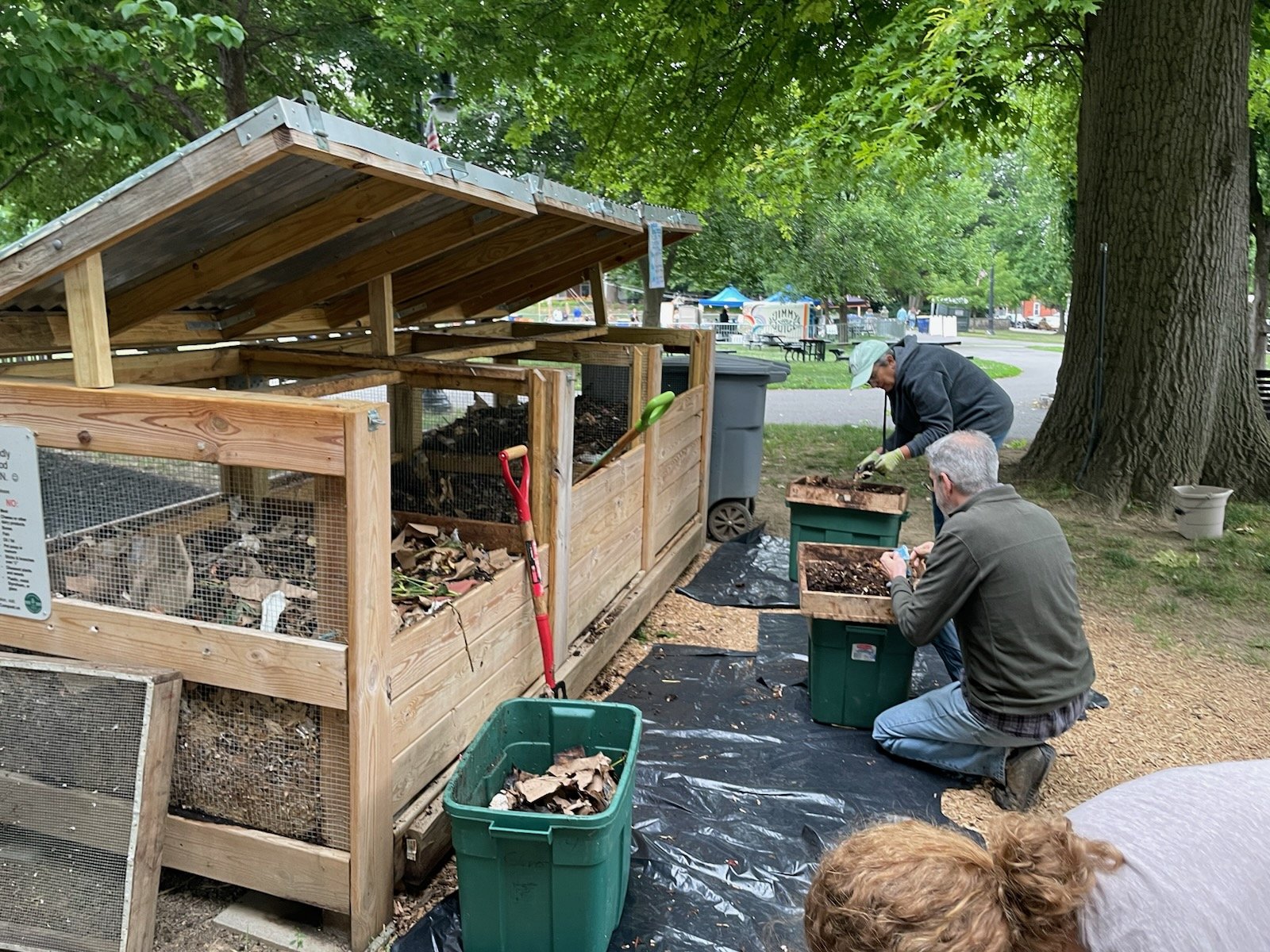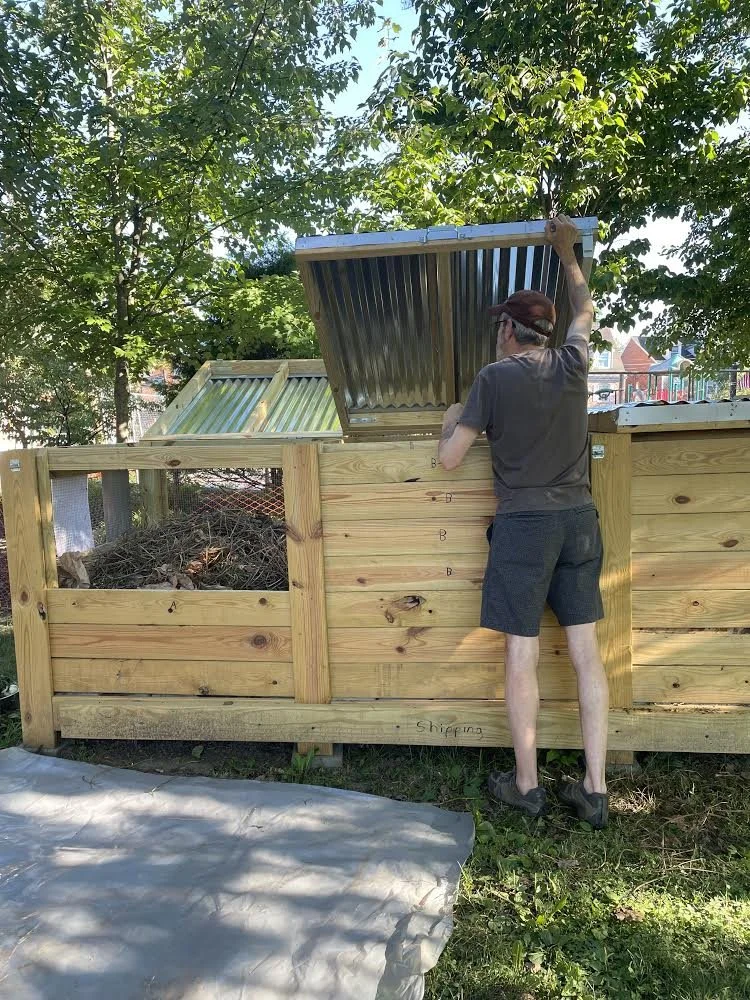ABOUT THE CO-OP
Who We Are
Lancaster Compost Co-Ops is a volunteer-led and run cooperative organization that aims to make composting and its benefits accessible to all residents in the City of Lancaster, Pennsylvania. Since the establishment of our first site during Earth Week 2021, we have launched several bins across the city, trained and welcomed hundreds of members, diverted thousands of pounds of food waste from a landfill, and built innumerable connections with the common purpose to improve humankind’s impact on the planet.
Our History
Residential compost pickup programs, whether municipal and for-profit, are becoming increasingly prevalent in cities across the United States. However, no options beyond using a private backyard were available to Lancaster residents. In 2018, determined to fill this need, Eve Bratman, Associate Professor of Environmental Studies at Franklin & Marshall College and former Chair of the City of Lancaster Planning Commission, started a grassroots campaign to gather input on composting solutions. She engaged a variety of community partners including the City of Lancaster, Regenerate Lancaster, and Urban Edge Farm / Susquehanna Sustainable Enterprises.
While the COVID-19 pandemic put the initiative on pause until 2021, a seed grant from the Center for Sustained Engagement with Lancaster, a partnership between Franklin & Marshall College and diverse constituencies in Lancaster County, funded the construction of the first bin. Since then, Lancaster Compost Co-Op has continued to use additional grant dollars to expand to more locations, grow our leadership team, and even deliver educational efforts through workshops and research.
Three Objectives of the Co-Op
Diverting Food Waste
Our goal is to make it simple, easy and accessible for the residents of the City of Lancaster to compost their organic waste by placing compost bins in public areas across the city, with the ultimate goal to divert waste from landfills and decrease greenhouse gas emissions.
Engaging Our Community Through Education
Our composting bins are more than a place to throw away waste, but a place for neighbors to build connections and work on common issues. We take pride that our sites are highly visible and unique to the personality and needs of the leadership team and neighborhood. We offer educational opportunities for the entire community, including a rain garden, book club, and nature workshops.
Generating Research to Drive Action
We conduct research to build data-based solutions for fostering equitable public engagement in environmental issues and strengthening community collaboration across Lancaster’s diverse populations. We hope to identify strategies to simultaneously reduce costs and greenhouse gas emissions. Our long-term goal is to ultimately become “obsolete” as a system-wide, integrated program is established to divert food waste.

Did You Know?
Almost 350 individuals have signed on to be members since the Co-Ops’ start in the spring of 2021. Source: Lancaster Compost Co-ops
Frequently Asked Questions
-
What a great question! Yes, there are a multitude of social, economic, and environmental benefits:
1) Strengthening community by bringing people together with a shared sense of neighborhood stewardship,
2) Reducing city costs by diverting solid waste from the municipal waste stream,
3) creating economic opportunities through new revenue streams, and
4) addressing climate change by reducing greenhouse gas emissions. -
Lancaster Compost Co-Ops is an independent, volunteer-led and run organization. We partner closely with the Lancaster City’s Department of Public Works’ Solid Waste and Recycling Bureau in its effort to expand recycling efforts, education, and outreach in the city.
-
Our funding is entirely from external grants and is primarily used for compost bin construction and tools. The funding to start this initiative was a seed grant from Center for Sustained Engagement with Lancaster, a partnership between Franklin & Marshall College and diverse constituencies in Lancaster County. In 2022 and 2023, respectively, we received The Healing The Plant Grant Program, from The GIANT Company, which supports organizations addressing food waste prevention, reduction, and recovery in Pennsylvania and surrounding states.
-
We can credit some incredible organizations for leading the charge in community composting. Urban Farm Plans designed the bin and has the instruction manual available for purchase. This bin model was adopted widely by the Washington, DC Parks and Recreation (DPR) Community Compost Cooperative Network, which operates over 50 cooperative compost sites in Washington, DC.
-
We are lucky to work with local designer and builder Jeff Feeman in Lancaster County. Jeff has been an incredible collaborator on this project. He has helped us to make minor modifications to the bin design to improve accessibility (i.e. adding a wooden prop to safely keep the bin lid open) and to increase decomposition (i.e. drilling small holes in the lid to promote some rainflow).
-
Various factors determine bin placement. Because increasing access is a primary focus, the bin must be in a public location that is easy to use by all community members interested in participating. Currently, many of our bins are in public parks. We place particular care to ensure that bins are in a visible location but safely away from private residences. In addition, we strive to have bins located across all quadrants of the city. Lastly, and most importantly, we only place bins in locations with a network of community support and identified co-captain volunteer.
-
We recommend that you check this map to see if a composting bin location is near you. If you do identify a need in your neighborhood and are interested in taking a leadership role to get one established in your neighborhood, please reach out to our leadership team via this form.
-
Before we install a new bin, our partners at the City administer a community survey to collect questions and concerns. We have had so much positive feedback. If and when issues do arise, we have worked with the local neighbors to make modifications to the bin to maximize benefit for all.
-
We are limited in the support we can provide. As a fully volunteer run organization, we are focused on building the composting network in the City of Lancaster. However, we would be happy to offer a 30 minute call with a member of our leadership team. Please use the contact form to reach out.
-
Research is a critical part of our organization’s mission. Our founder Professor Eve Bratman regularly conducts research to understand the environmental and social impact of the co-op and completed a white paper on the topic. We are open to sharing our data and insights as well as participating in speaking engagements. If you need additional support, please use the contact form.









